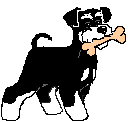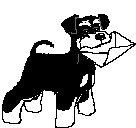Bladder Stones and Miniature Schnauzers

I want to discuss the common confusion between the two types of bladder stones (Calcium Oxulate Urolith stones and Struvite stones). Many smaller dogs because of how they were bred down are more prone to developing Struvite stones. Struvite stones have nothing to do with genetics but is based on how breeding dogs down can impact how their system and organs function and how the dog metabolizes food.
Bladder stone testing and why....the reason that a vet tests what type of stone the dog has, is to find out how to manage the prevention in the future based on the type of stone. Struvite stones are the most common type of stone and mostly found in small dogs. Struvite stones are NOT hereditary. They can be caused by the diet (PH levels, table food and higher protein), steroid treatment, holding the bladder too long and/or UTI's that the owner may or may not realize that the dog has. Calcium Oxulate Urolith stones are suspected to be genetically linked but studies can't 100% confirm the genetic link even in this type of stone.
I am also providing two credible sources. One link is information provided by a licensed veterinarian and explains each stone and the causes--between the two stones her site also explains that the Calcium Oxulate Urolith stones is the type of stone that is predisposed to be genetic. The second link is from a genetic welfare organization where they also explain that Calcium Oxulate Urolith stones are thought to be genetically linked and the genetic link in regards to Miniature Schnauzers. Again, these sites also state that studies can't find a consistent pattern to confirm 100% the inherited factor of Calcium Oxulate Urolith stones either.
https://healthypets.mercola.com/sites/healthypets/archive/2016/12/14/dog-life-threatening-urinary-condition.aspx
https://www.ufaw.org.uk/dogs/miniature-schnauzer---calcium-oxalate-urolithiasis-
Bladder stone testing and why....the reason that a vet tests what type of stone the dog has, is to find out how to manage the prevention in the future based on the type of stone. Struvite stones are the most common type of stone and mostly found in small dogs. Struvite stones are NOT hereditary. They can be caused by the diet (PH levels, table food and higher protein), steroid treatment, holding the bladder too long and/or UTI's that the owner may or may not realize that the dog has. Calcium Oxulate Urolith stones are suspected to be genetically linked but studies can't 100% confirm the genetic link even in this type of stone.
I am also providing two credible sources. One link is information provided by a licensed veterinarian and explains each stone and the causes--between the two stones her site also explains that the Calcium Oxulate Urolith stones is the type of stone that is predisposed to be genetic. The second link is from a genetic welfare organization where they also explain that Calcium Oxulate Urolith stones are thought to be genetically linked and the genetic link in regards to Miniature Schnauzers. Again, these sites also state that studies can't find a consistent pattern to confirm 100% the inherited factor of Calcium Oxulate Urolith stones either.
https://healthypets.mercola.com/sites/healthypets/archive/2016/12/14/dog-life-threatening-urinary-condition.aspx
https://www.ufaw.org.uk/dogs/miniature-schnauzer---calcium-oxalate-urolithiasis-

